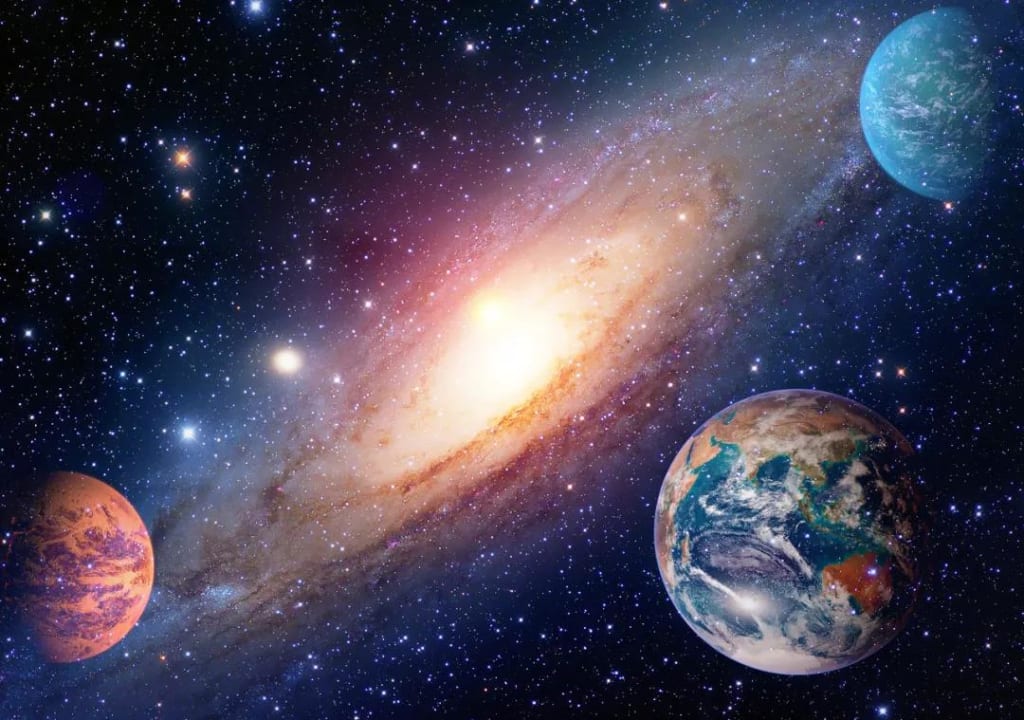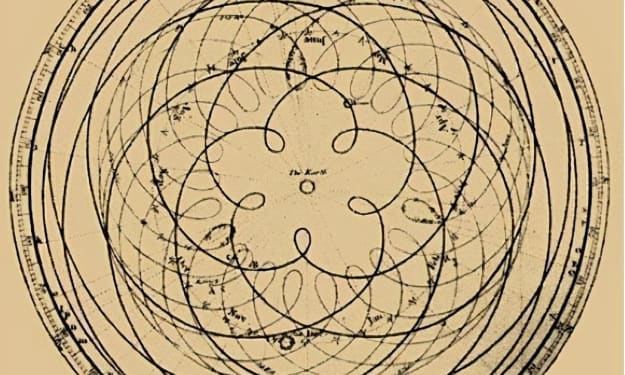
The ultimate question
With the existence of human civilization, ancient people began to wonder: how did the universe come into being?
The most powerful scholars of almost every age have pondered this question and continue to do so to this day. For example, Newton was one of the greatest minds in the history of science, and he came up with the law of gravitation that unified the laws of physics in heaven and on Earth, but he was struggling at the same time, because he never understood how the universe came into being. In Newton's case, he called this the first force, and he pondered this question all his life, but he was never able to give a satisfactory answer.
If you think about it for a second, Newton's law of gravitation says that things have forces that attract each other.
According to this theory, everything in the universe will converge towards the center under the influence of gravity, and finally converge into a point, but we do not observe this phenomenon. This also let Newton very helpless, so, he put forward a remedy, he thought the universe is infinite, everywhere is the center, gravity balance everywhere, the universe will not converge to the center. But who pushed these objects, he couldn't explain.
We call the theory of the evolution of the universe as a whole cosmology. The problem Newton was thinking about was cosmology. There were many famous people in the history of cosmology. Before Newton, there were Aristotle, Ptolemy, Copernicus and Kepler. After Newton, there were Einstein, Lemaitre, Gamow and others.
And the dominant theory in cosmology today is actually the λCDM model, where λ stands for dark energy and CDM stands for cold dark matter. This model actually foreshadows the frontiers of future cosmological research, namely dark energy and dark matter, which can be studied to understand the future direction of the universe.
The λ CDM model is based on the Big Bang model. The Big Bang model explains how the universe was formed and how it evolved in the past.
Big Bang model
The dominant scientific theory to explain the formation of the universe today is the Big Bang model. It should be said here that science, theology and philosophy all belong to explanatory systems with different emphases. Science relies on formal logic, systematic experiments and observations to prove, theology appeals to religious authorities to explain religious classics, and philosophy is purely rational speculation. They each have their own paradigms, no one is superior or inferior, no one is better than the other, it all depends on which one you believe. Since I am the creator of science, I will focus here on the prevailing scientific theory of the formation of the universe.
The Big Bang theory is based on the field equations of Einstein's general theory of relativity. Einstein discovered that the universe expands over time when he obtained the equations.
He himself did not agree with this view, Einstein had his own view of the universe, he believed that the universe is static, in terms of the universe is eternal.
So, in order to make the field equations of general relativity fit his view of the universe, Einstein added a cosmological constant to the field equations, and as long as this constant was properly valued, the universe could remain static.
However, many scientists do not approve of Einstein's operation in this way. They argued that the cosmological constant should be removed, that the universe should be expanding, and that if we extrapolate back in time, the universe should have been born at a singularity. Of course, that's no different than Einstein adding a cosmological constant. Science is empirical, so which is right, objectively speaking, should rely on experiment and observation.
It was around the 1920s that there was an astronomer named Hubble, who had been looking at objects in the Milky Way for a long time. He found that the vast majority of objects were moving away from us, and the further away they were, the faster they were moving away.
So what do Hubble's findings mean?
So let's think about it, if this is a motion of objects, then it's not true that most objects are moving away from us, and it's not true that the farther away they are, the faster they're moving away from us. There should be some moving towards us and some moving away from us. So there's only one explanation, and that's that space is expanding and taking these objects away from us, not that the objects themselves are moving.
Hubble published his own observations, which also declared the cosmological constant redundant and needed to be removed from the field equations of general relativity. When Einstein learned of this, he is said to have lamented that adding the cosmological constant to the field equations of general relativity was the biggest mistake of his life.
It was also the first observational evidence of the Big Bang. Then the study of the formation of the universe came to a near standstill, until a wave of particle physics came into play. They conducted a detailed study of the early evolution of the Big Bang and produced two other key pieces of evidence, the abundance of helium in the universe and the cosmic microwave background radiation.
To be fair, though, at that time, studying the Big Bang was extremely niche, and the scientific community didn't think much of the theory. Because scientists at the time thought this theory was a little crazy, that the only credible evidence was Hubble observations, and that wasn't enough.
Then, in the 1960s, someone actually discovered the cosmic microwave background. Later, scientists determined helium abundance. Both pieces of evidence are pretty close to what theory predicts. In other words, all three key pieces of evidence for the Big Bang theory have been found. This was when the scientific community began to take the theory seriously and began to regard it as a mainstream scientific theory, which it has continued to do to this day.
Now, based on the latest Planck satellite observations, we know that the universe was born 13.8 billion years ago, and that the particles of matter in the universe today formed within four minutes of the Big Bang.
By 380,000 years after the Big Bang, the temperature of the universe had dropped to about 3,000 degrees, the universe had become transparent from its chaotic state of particle porridge, photons began to travel through the universe, atomic structures were formed, and the solar system was formed 4.6 billion years ago.
I'm sure you're asking, what was the universe like before the Big Bang?
Hawking once gave an explanation that the universe is a combination of everything, including matter, energy, time and space. In other words, time didn't exist until after the universe exploded, and therefore didn't exist. What was before the universe?
Objectively speaking, this argument is not well accepted even by the scientific community. If we think about it, this problem is a modern version of the "first force" problem that Newton struggled with. Today, it remains a mystery.





Comments
There are no comments for this story
Be the first to respond and start the conversation.